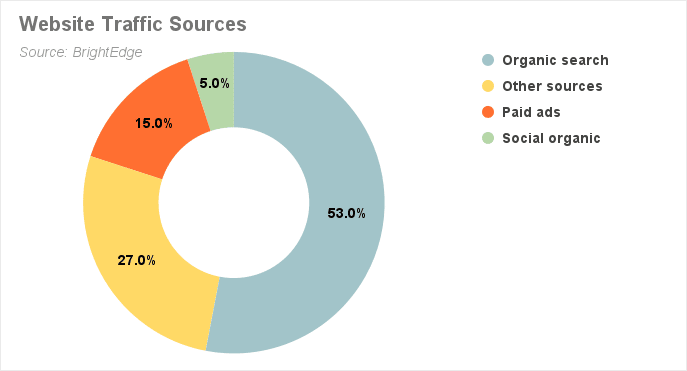Fact: People are using Google for every little decision they make in life.
We Google restaurants, transportation schedules, dry cleaners, and tree trimmers. Just this week I entered this three word phrase into a google search box: Best Hair Comb. As embarrassing as that is, it illustrates the fact that people search for literally everything you can imagine.
Churches need to start taking this to heart.
For centuries churches have understood that visibility was important. This is why churches were built with spires or crosses that rose above all the other buildings in town. It made the church and its mission visible for everyone to see.
Today we live in a time that is easier than ever to gain visibility, but sadly many of our churches stick with what worked 20 years ago and are missing an enormous opportunity. That opportunity is through internet search.
While search providers keep the exact formulas a secret in order to prevent people from gaming the system, there are things we do know about how to improve your visibility on search engines. In this article, we’ll cover everything you need to know about optimizing your church website google search results.
Let’s dive in.
Estimated reading time: 10 minutes
Table of contents
Google Search Optimization for Churches

Search Engine Optimization (SEO) is the practice of enhancing a website to improve its visibility on search engines like Google, Bing, and Yahoo. By optimizing content and technical aspects, websites can rank higher in search results, driving more organic traffic.
For church websites, SEO involves a range of strategies from keyword optimization, improving site speed, ensuring mobile-friendliness, and creating quality content that answers the queries of users. This practice is crucial as it helps connect people seeking spiritual guidance, community involvement, or specific church services with your congregation.
The Importance of SEO for Church Websites
In the digital age, people turn to search engines to find local services and community organizations, including churches. Implementing church SEO ensures that your church appears prominently when individuals search for religious services, events, or community activities.
A well-optimized website can attract new visitors, provide valuable information to current members, and enhance the overall online presence of the church. By utilizing SEO, churches can effectively reach out to individuals in their time of need, offering spiritual support and fostering a sense of community. Additionally, having a strong online presence can help in building trust and credibility among both potential and existing members.
According to BrightEdge over 50% of websites get their traffic from search engines. That means that getting your website to the top of Google is more important than ever!

Leveraging Local SEO for Better Reach
Local SEO focuses on optimizing a website to appear in local search results, making it particularly relevant for churches that serve specific communities. When people search for terms like “churches near me” or “Sunday services in [City Name],” local SEO ensures that your church appears in these search results. This is achieved by optimizing the church’s Google Business profile, incorporating location-specific keywords, and garnering positive reviews.
By prioritizing local SEO, church websites can ensure they reach nearby residents who are most likely to visit and engage with the church. This localized approach not only increases attendance but also fosters stronger community ties and ensures the church remains a vital part of the local fabric.
In conclusion, incorporating search engine optimization into church websites is essential for enhancing visibility, attracting new members, and engaging with the community. By focusing on both general SEO practices and local SEO strategies, churches can effectively reach their target audience, ensuring they fulfill their mission of providing spiritual guidance and support.
4 Keys to Make Your Website Appear on Google

That’s everything you need to know about getting your website on Google! You know what SEO is, but what are the actual steps you can take to achieve the results you want? Here are 4 awesome keys to help you get your website to appear on Google.
1. Get a Google Grant
While there is no sure fire way to ensure you will come up on the first page of Google (anyone who says differently is lying to your face) this is the closest that you will get. Google makes most of its money by selling advertising. The only way to ensure that you will come up on a google search is to pay for a spot at the top, bottom or right hand column of a search.
And these ads can be very expensive. Depending on the competitiveness of the market you can pay anywhere from a few cents to over $50 dollars for just a click onto your websites.
But for churches and all other non profits google offers a grant that gives $10,000 (not a typo) each month (also not a typo) to be spent on advertising on its search engines. There is an application process but almost every church qualifies if they go through it.
If you are looking for a way to reach people and not taking advantage of this program, you need to do so today.
The average church will pay just under $2 per click on a paid ad in google search. That means over 5000 visitors to your church website each month. If you can convert just 1% of them into visitors to your church…. that would mean 50 visitors this month.
Would 600 new visitors to your church this year make an impact on your ministry… my guess is it would.
2. Create Great Content
If you are looking for better organic (non-paid) search results the one tried and true method to make that happen is creating great content. Chances are you are doing this all ready.
When we talk about content most people think this means they have to start a blog and they need to add one more thing to their all ready busy schedule just for the chance of doing a little better on search engines.
Ain’t nobody got time for that.
In the church we create content every single week. Some us do this multiple times. We call them sermons.
Each week Pastors spend anywhere from 2 to 20 hours praying, preparing and writing sermons. Instead of creating new content, a great start would be just taking the content you are all ready working hard to make and turning it into content for the web.
For some churches that means providing message transcripts of the message, for others its bullet points. For others it is a few highlights and some community questions.
No matter what you have, you need to find a way to get your sermons online in both a media and text form, and not let that resource got to waste.
3. Use The Word “Church”

Over the past three decades there was a move away from using the word church in the names of our churches. It was much more trendy to be known as a community, or a fellowship, or a family.
While we didn’t know it at the time, in an attempt to make ourselves more appealing we have made ourselves less visible online.
When people are looking for a church to be a part of, they don’t go online searching for “fellowships” in their city. That is more likely to be someone looking for a Lord of the Rings LARPing group to join.
They go online and search for “Church in Atlanta” or “Des Moines Churches”.
The only way that search engines know that you are relevant to someone looking for churches online is if you use the word church in your content. You need to be very intentional about this.
Let me be clear, there is no value to key word stuffing. Don’t use the word church 45 times on every page. Make sure that your content readable, and use your key word a few times. As a general rule you want to use the word church between 1%-2% of yrou total word count. So if you have 200 words of content, using the word church 3 times would be appropriate.
If you do this you will have a reasonable shot at appearing toward the top of the pile when people are looking for a church.
4. Optimize for SEO
Finally, here are a bunch of small tips for optimizing your website for SEO.
Utilize Local SEO and Google Maps:
Ensure your church appears prominently in local search results by optimizing for local SEO. Claim and optimize your Google My Business listing, providing accurate information about your church building’s address, contact details, and service times. Adding high-quality photos of the church building can enhance your profile. Encourage congregation members to leave positive reviews, which can boost your visibility on Google Maps and attract more visitors searching for local churches.
Optimize On-Page Content
Focus on incorporating relevant keywords throughout your website, including in titles, meta descriptions, headers, and body content. Use phrases like “church services in [City Name]” or “community events at [Church Name]” to target local searches. Create informative and engaging content about your church’s activities, mission, and services. Regularly updating a blog with relevant topics can also improve your search rankings and provide valuable information to your audience.
Mobile-Friendly Design
Ensure your website is mobile-friendly, as many users search for information on their phones. A responsive design that adjusts to various screen sizes will improve user experience and search engine rankings. Google prioritizes mobile-friendly sites, making this a crucial aspect of your church marketing strategy.
Build Quality Backlinks
Acquire backlinks from reputable websites to enhance your church’s credibility. Collaborate with local organizations, religious directories, and community websites to get links back to your site. Quality backlinks signal to search engines that your site is trustworthy and relevant.
Optimize for Speed and Performance
A fast-loading website provides a better user experience and is favored by search engines. Compress images, leverage browser caching, and use a reliable hosting service to improve your site’s speed and performance.
Implementing these tips as part of your church marketing strategy will help improve your church’s visibility, attract new members, and foster community engagement.
Church Website Google Search

Securing a strong online presence for your church involves a multifaceted approach. One key step is applying for the Google Ad Grants program, which offers eligible churches up to $10,000 per month in free advertising. This can significantly boost your visibility on Google searches
Equally important is creating great content that resonates with your audience and reflects your church’s mission and activities. Consistently updating your website with engaging articles, event announcements, and community stories will attract visitors and improve your search rankings.
By optimizing for SEO—focusing on relevant keywords, local search optimization, and maintaining a mobile-friendly, fast-loading site—you can ensure your church appears prominently in search results. Combining these strategies will help your church reach a wider audience, attract new members, and strengthen its online community presence.
Has your church done anything else to make yourselves visible online? We would love to hear about it in the comments below.





Comments 1
Your article was extremely informative. And I believe will prove useful once implemented.